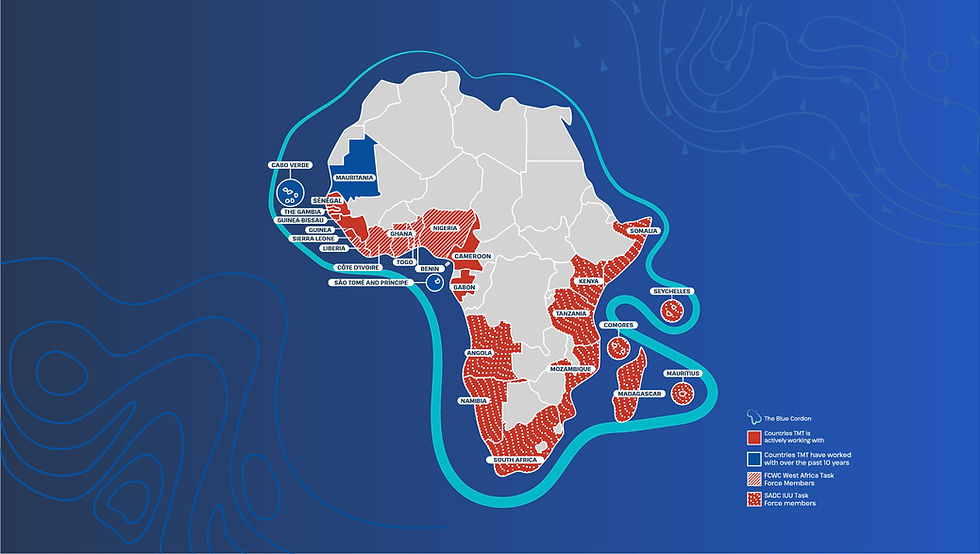New Report - Regional Cooperation to Stop Illegal Fishing: A Tale of Two Task Forces
- Trygg Mat Tracking TMT
- Jul 27, 2021
- 3 min read
We are happy to have collaborated on a new report ‘Regional Cooperation to Stop Illegal Fishing: A Tale of Two Task Forces’. The report tells the story of the development and operations of two regional task forces - FISH-i Africa and the West Africa Task Force - and how they have been game-changing in combatting illegal fishing in East and West Africa.
The report details the why, where, who, how and what in respect to the task forces, it considers what they achieved and what the future holds for these unique examples of regional cooperation.
It showcases what worked, lesson learning, and provides a comparative analysis of the two task forces, considering their differences and similarities, and highlighting how these differences shaped the two models.
The report, written by Stop Illegal Fishing (SIF) in collaboration with the Fisheries Committee for the West Central Gulf of Guinea (FCWC) Secretariat and Trygg Mat Tracking (TMT), is intended for regional and international policy makers, funding organisations, national agencies and all those interested to understanding better how the regional task force approach can help to end illegal fishing.
Seraphin Dedi Nadje, Secretary General of the FCWC said ‘The West Africa Task Force has been instrumental in operationalising key FCWC commitments on sharing information and cooperating regionally to fight IUU fishing. As we develop our RMCSC we build on the solid foundation provided by the WATF processes. Our region is stronger than ever. We appreciate the continuing support of Norad in funding this cooperative mechanism and our partners at Trygg Mat Tracking, Stop Illegal Fishing and the European Union Fisheries Control Agency who are working with us to implement it.’
Dr. Motseki Hlatshwayo, Senior Fisheries Advisor, Southern African Development Community (SADC) Secretariat, stated, ‘The development of this report provides a timely opportunity to reflect on the development and evolution of the FISH-i Africa and the West Africa Task Forces. By taking stock of their many achievements we can fully appreciate the contribution made by these two initiatives to forge new ways of working, and to overcome some of the most challenging barriers to tackling the insidious problem of IUU fishing.’
Elsa da Gloria Pátria, Chairperson of SIF, said, “We hope that you can share our sense of success in developing these cooperations and the significant steps made towards developing mechanisms that will, in time, stop illegal fishing.”
Sandy Davies, SIF, stated, ‘We have long known that cooperation and collaboration are key to successful efforts to stop illegal fishing. IUU fishing takes place across jurisdictions often targeting shared fish stocks and we know that illegal operators identify and utilise any systemic weaknesses. By working as a united region we can see the benefits of working together. It may not always be easy but there are tangible benefits in terms of both cost and success.’
Duncan Copeland, Executive Director, TMT said ‘The FISH-i Africa and the West Africa Task Force experiences clearly show that cooperation, information sharing and mutual capacity building between countries, between relevant agencies within each country, and between key non-State partners is effective in targeting illegal fishing operations. It requires work, resources, and will, but the model is powerful and can be adapted to other areas of the world’.
The report was presented at the first virtual Global Fisheries Enforcement Training Workshop (GFETW) on 13 and 14 July, 2021.
TMT is proud to be a founding member of the coordinating and technical teams to both task forces, and congratulate the member States on all that has been achieved to date. As FISH-i Africa and the West Africa Task Force are integrated into the SADC Regional Fisheries Monitoring Control and Surveillance Coordination Centre (MCSCC) and the FCWC Regional Monitoring Control and Surveillance Centre (RMCSC) respectively, we look forward to continuing our close collaboration with the member States, the FCWC, SADC, SIF and our technical partners in further efforts to end illegal fishing in the Western Indian Ocean, Southern Africa, and the Gulf of Guinea.






